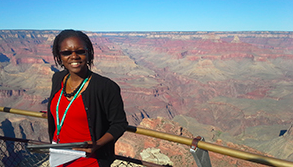Submitted by Eleanor Mahoney
on
Turkiya Lowe (PhD in History, 2010) was named the National Park Service’s new Chief Historian and Deputy Federal Preservation Officer in January 2017. Lowe is the first woman and first African American to hold the position. She has close to two decades of experience working in the NPS, and most recently served as Southeast Region chief historian and chief for the Southeast Region’s Cultural Resources Research and Science Branch. In 2016, she also held the position of Acting Superintendent of Cane River Creole National Historical Park in Natchitoches, Louisiana.
In September 2017, Dr. Lowe was gracious enough to participate in an interview via email. Eleanor Mahoney, a PhD Candidate in the Department of History, conducted the exchange.
Eleanor Mahoney: How did you get interested in working for the NPS?
Turkiya Lowe: I first became interested in an NPS career while taking a graduate-level public history seminar at Howard University during the second half of my Junior year (I'd finished my major classes a little early). The class was team taught by two NPS historians who served in cultural resources management. That following summer, my Howard University professor, Dr. Elizabeth-Clark Lewis, urged me to apply for an internship with NPS through the Cultural Resources Diversity Internship Program. While researching the history of racial desegregation of public education, I became fascinated by HU's role in both the creating the NAACP legal strategy and conducting the social science research that underpinned the Brown v. BOE arguments. As I returned to campus, surrounded by the buildings where this work had taken place, I determined that I wanted to help preserve other places that are physical manifestations of past events for others to experience and enjoy.
With this experience, I knew that I wanted to pursue a Ph.D. in African American History with a focus on the American West. I knew that such a study would strengthen my research and documentation abilities and experience. UW with the Dr. Quintard Taylor as Bullitt Chair provided a unique opportunity to explore what was then an underresearched topic.
Eleanor Mahoney: How does your experience as a history graduate student at UW shape your perspective on the history presented in park units and at / with partner sites and organizations?
Turkiya Lowe: Graduate work at UW deepened my knowledge of the historiography of African American history in the U.S West while sharpening my understanding of theoretical notions of the intersectionality of power, nationalism, labor, and gender. Not only did it expand my skill at identifying and documenting where important historical events had taken place, my UW experience developed my ability to extrapolate the various meanings and impacts of events, and trace their continuity/transformation into the present.
While at UW, I continued working with NPS and other organizations such as the Seattle Chapter of the Links, Inc who connecting PNW places with important regional and national history. As I completed my graduate work, I became convince that places were history happened must tell nuanced stories that incorporate multiple perspectives the historical people who lived the events.
Eleanor Mahoney: What are your responsibilities as Chief Historian?
Turkiya Lowe: Recently, the positio has moved away from directly conducting research and writing to facilitating organizational access to current research and scholarship, source materials, and resources for a great group of dedicated NPS park and program staff. The facilitation responsibility includes forging both formal and informal partnerships with professional historical associations, cultural resources management organizations, independent scholars as well as responding to historical information and presentation requests from Congress, local/state officials, partner orgs., and the general public related to the history of the NPS and historic preservation.
Another primary responsibility is serve as a subject matter expert on history projects undertaken within the National Park Service, such as administrative histories of specific parks and programs and national register of historic places nomination as well as advise on interpretative content and educational programs presented in the parks.
Eleanor Mahoney: What are your favorite / most rewarding elements of the position?
Turkiya Lowe: I have so many favorite and most rewarding moments as an NPS historian. A few that come quickly to mind: visiting a national park unit or other historic site to see visitors experiencing interpretation (exhibits, waysides, brochures, webpages) that utilize research generated by NPS historians; attending dedication ceremonies for newly designated historic sites; and/or spearheading scholars roundtables at a new park unit where the most current and reliable associated research is discussed.
